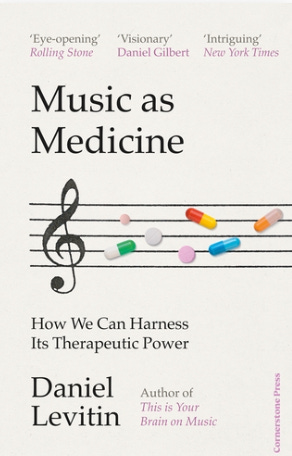I picked up Music as Medicine by Daniel Levitin because of the incredible work our music therapists do at SGH. A while back, I came across a CNA article about how music therapy was helping stroke survivors, and it stuck with me. Then, in a conversation with Asst Prof Dr Kat Agres, she shared some fascinating insights about live versus recorded music and how it impacts patients. So, when I was walking past Kinokuniya and saw this book staring at me, it felt like a sign.
The Science Behind the Sound
Levitin dives into the neuroscience of music—how it affects memory, stress, and even physical healing. He pulls together research showing how music can ease pain, boost cognitive function, and make people more emotionally resilient. He’s got a knack for making the complex stuff easy to digest, explaining how rhythms and harmonies literally rewire our brains.
Healing Through Harmony
One of the coolest parts of the book is its deep dive into music therapy, something I’ve seen firsthand in the hospital. Levitin highlights how live and recorded music are used in hospitals to improve patient outcomes, something that echoes what Dr. Agres mentioned. He also ties it back to history—how music has always been a form of healing, from Indigenous chants to modern therapy sessions.
Claire Oppert’s The Schubert Treatment gets a shout-out here, reinforcing the idea that live classical music can bring comfort even in the toughest moments. Levitin makes a strong case that music isn’t just background noise—it should be an integral part of healthcare.
A Personal and Universal Journey
This isn’t just a science book—it’s personal. Levitin brings in his own experiences as a musician and researcher, sharing moments where music created real, tangible change in people’s lives. He includes stories of patients, caregivers, and musicians, making the science feel even more powerful.
A Call to Action
Levitin doesn’t just want us to appreciate music’s impact—he wants healthcare systems to take it seriously. He argues for more music therapy programs and research, and honestly, after reading this, it’s hard to disagree. His message aligns with the work being done at places like the Centre for Music and Health, further validating that this isn’t just feel-good stuff—it’s real medicine.
Final Thoughts
Music as Medicine is a brilliant mix of science, storytelling, and advocacy. Levitin makes it clear that music isn’t just entertainment—it’s healing, and we should be using it more. Whether you’re a musician, a healthcare professional, or just someone who’s ever felt a song hit you right in the gut, this book will make you think differently about the power of sound.
Rating: 5/5
Related Reads:
The Schubert Treatment by Claire Oppert
This Is Your Brain on Music by Daniel Levitin
Musicophilia by Oliver Sacks
Why We Love Music by John Powell
References:
The Impact of Live vs Pre-recorded Music on Dialysis PatientsCentre for Music and Health. Retrieved from https://centreformusicandhealth.sg/
Channel News Asia. (2024). Music therapy and stroke recovery at SGH. Retrieved from https://www.channelnewsasia.com/singapore/music-therapy-stroke-survivor-singapore-general-hospital-3794836
Victoria Ekstrom is a consultant gastroenterologist at Singapore General Hospital and co-lead for Narratives in Medicine at SingHealth Duke Medical Humanities Institute. With a background in behavioral science, she is passionate about the intersection of medicine, communication, and the arts. Through her writing, she explores how narratives and humanities can transform patient care and medical education.





